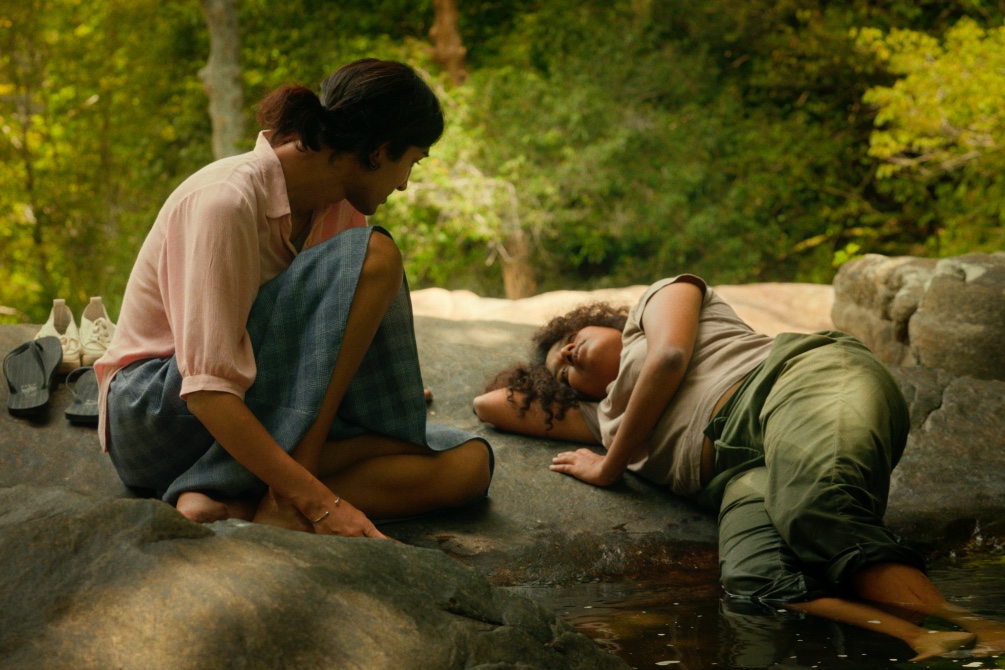How do we retain our humanity in an age of constant surveillance and device addiction? And how do we stay connected to spiritual and natural forces when technology is taking over our lives?
These are among the many questions asked in sci-fi drama Spying Stars, directed by award-winning Sri Lankan director Vimukthi Jayasundara, which is receiving its world premiere here in Busan’s new Competition section.
Set in the future at a time when the world is dominated by machines and hit by a pandemic with its origins in technology, the film follows a scientist, played by Indira Tiwari (Gangubai Kathiawadi), who is forced to quarantine in a remote hotel where a mysterious satellite starts following her and interfering in her thoughts and emotions.
At the same time dealing with grief due to the loss of her father, the scientist finally escapes and seeks refuge with a mother and her transgender daughter. The three women, who have all been marginalized for different reasons, begin to connect with the spiritual forces of the earth using the power of sound and vibration.
Jayasundara says he started thinking about the film during the pandemic. “I’d been spending time in southern India in an ashram, then Covid came and brought another kind of isolation,” he says. “I wanted to make something that reflects how the whole world could experience something similar but also lose a sense of real connection. We’re all living online but there’s something incomplete in the way we communicate, something is missing.”
Spying Stars is produced by Vincent Wang’s Paris-based House On Fire and Indian producer Nila Madhab Panda’s Eleenora Images, with Michel Klein, Arfi Lamba and Katharina Suckale on board as co-producers. Diversion is handling international sales. The cast also includes Hidaayath Hazeer, Saumya Liyanage and Samanalee Fonseka.
The France-India-Sri Lanka co-production was filmed in Sri Lanka’s Knuckles Mountain Range, while the mysterious satellite and other effects were also created by animators in Sri Lanka. “We have a growing CG animation and VFX industry in Sri Lanka,” Jayasundara observes, adding that the country is bouncing back from the financial crisis it experienced at the end of the pandemic. Sri Lanka also appears to be drawing more interest from international filmmakers – Apichatpong Weerasethakul is currently in the country prepping his new feature.
Jayasundara is an established voice in international cinema. He won Cannes film festival’s Camera d’Or in 2005 for his debut feature, The Forsaken Land, while his Between Two Worlds (2009) premiered in Venice; Mushrooms (Chatrak, 2011) in Cannes and Dark In The White Light (2015) in Locarno. His films have often dealt in an abstract way with the Civil War that racked Sri Lanka for 26 years.
He has taken a more personal turn with Spying Stars, his first feature film in a decade, although the film also has socio-political elements. After living for several years in Paris, he explains that he decided to take a break from filmmaking and embarked on a spiritual journey, at the same time dealing with the loss of his father.
“I was very young when I won the Camera d’Or – only 27 years old – and never had anything else in my life except cinema,” Jayasundara says. “When the hard times came, I had a lot of emotions that I wanted to deal with just by myself rather than through filmmaking. I realized grief is like an everlasting wound in our hearts; you can meet new people but it’s impossible to replace the people who were part of your past.” Jayasundara’s own personal experience with grief is explored in the film through the scientist who has also lost her father, but in her case is prevented by technology from having a private space to grieve.
Sound is also an important element in the film, encapsulating creation myths about sound and vibration being the source of all matter, ideas which are also present in string theory and quantum mechanics. Jayasundara worked with acclaimed French sound designer Roman Dymny (Yakushima’s Illusion, Green Border) on the film experimenting with human and synthetic sounds at different frequencies. Alokananda Dasgupta (Jubilee, Sacred Games) composed the soundtrack.
Jayasundara has a long association with Busan International Film Festival. Most of his films have played at the festival and he also served as a mentor at the BIFF Asian Film Academy (AFA) in 2016, the year that Taiwan’s Tsai Ming-liang served as dean. He also met the cinematographer on Spying Stars, Eeshit Narain, and the film’s editor Saman Alvitigala at AFA.
“Audiences are very supportive in BIFF, so when we heard about this new competition section, we thought why not give it a try because the whole world is looking, the international press is in Busan, so there’s nothing lacking compared to other international film festivals,” Jayasundara say. “It’s not easy to organize a film festival through so many difficulties, but this festival is a wonderful event that takes cinema very seriously as an art.”
Jayasundara plans to relaese Spying Stars in Sri Lankan cinemas following a European premiere early next year. He says that young audiences are coming back to local cinemas, which recently enjoyed a big hit with raunchy comedy Tentigo, and that streaming has not had as big an impact in Sri Lanka as it has in India and other markets around the world.
“Of course young people are on their phones and using YouTube all the time, but they’re mostly looking at free content as it was difficult to do credit card payments during the financial crisis. Ironically that has been a benefit for the cinemas.”
Spying Stars receives its world premiere in Busan International Film Festival on September 23.
The post Vimukthi Jayasundara On Spirituality, Sound & Surveillance In Busan Competition Title ‘Spying Stars’ appeared first on Deadline.




